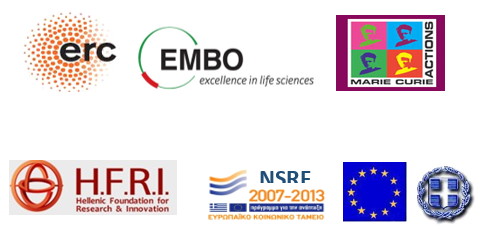Decoding gene and (epi)genome control in health and disease
Genomic instability has been largely implicated in human pathology as well as cancer and rare human syndromes with premature aging features and severe neurodegenerative and developmental abnormalities. Our research focuses on how the regulatory networks and dynamics of the transcriptional and chromatin landscapes are affected in humans in deficient situations or upon genotoxin-induced stress. It involves the implementation of advanced molecular and cellular biology and biochemical methods and functional system biology approaches (bulk and single-cell (sc) transcriptomic and (epi)genomic analyses).
The ultimate goal of our studies is to reveal accurate disease biological processes and dissect therapy resistance mechanisms that may lead to the development of novel therapeutic approaches and improve patients’ quality of life. .
Our work is funded by
